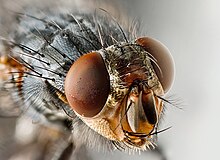| Muscomorpha | |
|---|---|

| |
| Blowfly showing the three-segmented antennae and the arista | |
| Scientific classification | |
| Domain: | Eukaryota |
| Kingdom: | Animalia |
| Phylum: | Arthropoda |
| Class: | Insecta |
| Order: | Diptera |
| Suborder: | Brachycera |
| Infraorder: | Muscomorpha |
| Sections | |
The Brachyceran infraorder Muscomorpha is a large and diverse group of flies, containing the bulk of the Brachycera and most of the known flies. It includes a number of the most familiar flies, such as the housefly, the fruit fly, and the blow fly. The antennae are short, usually three-segmented, with a dorsal arista. Their bodies are often highly setose, and the pattern of setae is often taxonomically important.
The larvae of muscomorphs (in the sense the name is used here; see below) have reduced head capsules, and the pupae are formed inside the exoskeleton of the last larval instar. Exit from this puparium is by a circular line of weakness, and this pupal type is called "cyclorrhaphous"; this feature gives this group of flies their traditional name, Cyclorrhapha.